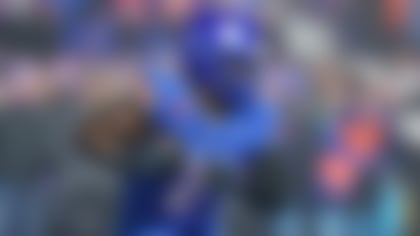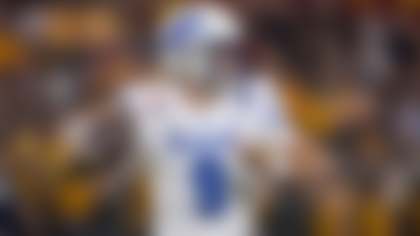Why provide instant grades on the selections of prospects who have yet to take an NFL snap? Well, you're reading this, aren't you? Considering the makeup of every roster and the factors surrounding each pick, Gennaro Filice and Nick Shook attempt a division-by-division assessment of the 2018 NFL Draft. Below is Nick's review of the AFC South.
NOTABLE SELECTIONS
BEST PICK: Quenton Nelson, G, Notre Dame
Indianapolis Colts, Round 1, No. 6 overall
Indianapolis could have made a sexier pick, a skill-position player who would sell jerseys, but GM Chris Ballard stayed the course and addressed the team's most important need: interior line. Nelson was the consensus top lineman on the board and will immediately upgrade the Colts' unit, which is vital to protecting and prolonging the career of Andrew Luck (should he return to play sometime in the near future). It's also important to the overall success of the offense, so much that Ballard went with another guard in the next round. Nelson is the winner in the division, though, because he's one of the most impressive interior linemen in recent years and should make an instant impact Indianapolis has sorely needed.
MOST SURPRISING PICK: Taven Bryan, DT, Florida
Jacksonville Jaguars, Round 1, No. 29 overall
There were at least a handful of options available at 29, including the favorite pick of many, Lamar Jackson, but Jacksonville instead opted to add depth at a position of strength. The Jaguars' rotation on the D-line last season helped to keep that unit fresh and dominant, so it's easy to see how Bryan fits in with that overall strategy. Still, the move was a bit surprising because the team had a need at receiver; though, they ended up addressing that in Round 2 with D.J. Chark. Bryan will be yet another contributor to an already stout line full of stars. The rich get richer, even if we didn't see it coming.
BIGGEST SLEEPER: Ronnie Harrison, S, Alabama
Jacksonville Jaguars, Round 3, No. 93 overall
Harrison was a third-round pick but has the potential to be much more. The safety can bring an added level of physicality to the backend of Jacksonville's defense, making it that much more menacing. The pick also is a potential signal that the Jaguars could move on from Tashaun Gipson (who's still owed $20 million over the next three seasons) in a cost-cutting measure that could prove to be prescient when more of its core is up for new deals in the coming years. Should Harrison develop into a starter, his ceiling is high -- high as a young star.
TEAM GRADES
NOTE: Draft classes are ranked from best to worst within the division.
» Round 1: (No. 6 overall) Quenton Nelson, G, Notre Dame.
» Round 2: (No. 36) Darius Leonard, LB, South Carolina State; (No. 37) Braden Smith, G, Auburn; (No. 52) Kemoko Turay, EDGE, Rutgers; (No. 64) Tyquan Lewis, DE, Ohio State.
» Round 4: (No. 104) Nyheim Hines, RB, N.C. State.
» Round 5: (No. 159) Daurice Fountain, WR, Northern Iowa; (No. 169) Jordan Wilkins, RB, Mississippi.
» Round 6: (No. 185) Deon Cain, WR, Clemson.
» Round 7: (No. 221) Matthew Adams, LB, Houston; (No. 235) Zaire Franklin, LB, Syracuse.
After years of trotting Andrew Luck out behind a patchwork line, GM Chris Ballard finally had enough and selected not one, but two guards in the first two rounds. He gets an A for taking Nelson, and an A for doubling down on the position in Round 2 where he selected first-team All-American Smith. Suddenly, when combined with center Ryan Kelly, Indianapolis' line doesn't look all that bad. Adding Lewis and Turay is an attempt to improve on the league's 31st-highest sack total (25) in 2017, though I thought Lewis was selected one round too early. I found it surprising in a draft that was deep at running back, Ballard opted to wait until the fourth round to address the position. Marlon Mack, a fourth-rounder last year and the only returning Colts rusher to have more than 25 carries in 2018, will be joined by newcomers Hines and Wilkins, suggesting that Ballard wants to address the position with quantity over perceived quality. That's no knock on Hines, who I've enjoyed watching; it just seems to be a peculiar strategy and my reason for bringing them down from an A-.
» Round 1: (No. 22 overall) Rashaan Evans, LB, Alabama.
» Round 2: (No. 41) Harold Landry, EDGE, Boston College.
» Round 5: (No. 152) Dane Cruikshank, S, Arizona.
» Round 6: (No. 199) Luke Falk, QB, Washington State.
Tennessee didn't have a ton of picks, but for a team that has a lot of its core intact, the Titans still managed to draft efficiently. Titans GM Jon Robinson dealt some picks to maneuver and select players at positions of need, adding Rashaan Evans, who should immediately replace the departed Avery Williamson. Landry is a different type of edge defender than Brian Orakpo or Derrick Morgan, but will eventually replace one of the two, who are both over 30 years old and are in contract years. Cruikshank and Falk are good depth picks, with the former potentially serving as a backup defensive back and key special teamer and the latter growing into a reliable second-stringer behind Marcus Mariota.
» Round 1: (No. 29 overall) Taven Bryan, DT, Florida.
» Round 2: (No. 61) D.J. Chark, WR, LSU.
» Round 3: (No. 93) Ronnie Harrison, S, Alabama.
» Round 4: (No. 129) Will Richardson, T, N.C. State.
» Round 6: (No. 203) Tanner Lee, QB, Nebraska.
» Round 7: (No. 230) Leon Jacobs, EDGE, Wisconsin; (No. 247) Logan Cooke, P, Mississippi State.
Dave Caldwell can't get enough of front-seven defenders, apparently, but that's not a bad thing with this squad. Bryan will arrive in Jacksonville as a reliable rotational player, which was a major key to the Jaguars' sustained rush in 2017, thanks to rotating in players such as Marcell Dareus. I wrote about Jacksonville's suddenly concerning receiving corps after the departure of Allen Robinson, but I'm glad to say they've found his replacement in Chark, a big receiver who commands respect in the deep game with a 4.34 40-yard dash time. Harrison stands to become the hammer on the back end of Jacksonville's secondary, bringing a wallop between corners Jalen Ramsey and A.J. Bouye. Richardson is a depth pick who could end up unseating Jermey Parnell at right tackle down the road. It wasn't an eye-popping draft, but looks like it should produce three contributors, which is solid.
» Round 3: (No. 68 overall) Justin Reid, S, Stanford; (No. 80) Martinas Rankin, OL, Mississippi State;(No. 98) Jordan Akins, TE, Central Florida.
» Round 4: (No. 103) Keke Coutee, WR, Texas Tech.
» Round 6: (No. 177) Duke Ejiofor, DE, Wake Forest; (No. 211) Jordan Thomas, TE, Mississippi State; (No. 214) Peter Kalambayi, EDGE, Stanford.
» Round 7: (No. 222) Jermaine Kelly, DB, San Jose State.
A lot of Houston's draft was spent last year when it traded up to get Deshaun Watson, which seems like a wise move at this point. As a result (plus the cleansing of Brock Osweiler that cost them a second-round pick), the Texans didn't have a selection until the third round, but were still able to found a smart, instinctive safety with the size and speed teams desire -- and they got him a round later than he was projected. Houston found a swing lineman in Rankin, who's listed at center but earned All-SEC honors playing tackle. His versatility (borne out of some weaknesses at certain positions) should prove valuable for a team that's needed to improve the group. Akins was a former minor league baseball player and is a 26-year-old rookie who has pass-catching ability, but was selected much earlier than expected. Coutee could end up being a good value pick thanks to his 4.43 speed.
Follow Nick Shook on Twitter @TheNickShook.
















